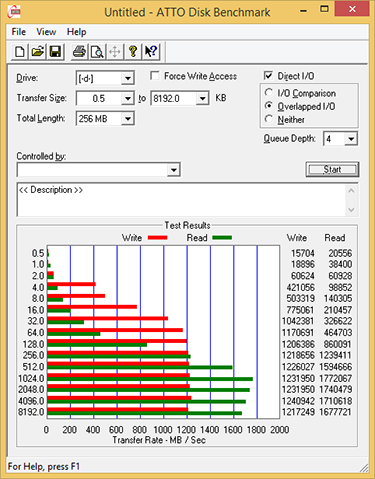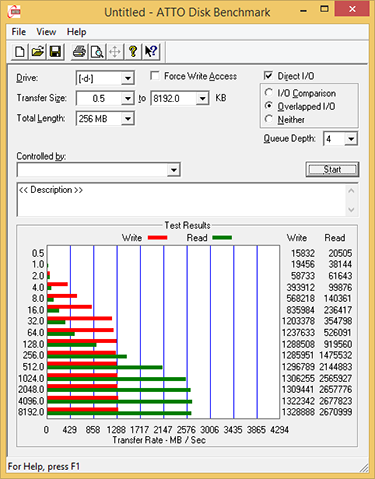Testing Methodology
Test Bench |
|||||||||
|---|---|---|---|---|---|---|---|---|---|
| CPU | Intel Core i7-5960X (3.5GHz, 20MB cache, octo-core) | ||||||||
| Motherboard | Asus X99 Sabertooth TUF | ||||||||
| Memory | 16GB Corsair LPX 2,800 (4x4GB) DDR4 @ 2,133MHz | ||||||||
| Storage Controllers | Intel X99 (PCIe x4, NVMe and SATA 6Gbps, AHCI) | ||||||||
| Graphics | EVGA GeForce GTX 780 Ti | ||||||||
| Power Supply | Corsair AX760i | ||||||||
| Operating System | Windows 8.1 (64-bit) - Intel-optimised NVMe driver | ||||||||
Comparison Drive Configurations |
||||
|---|---|---|---|---|
| Total Capacity | Controller | Firmware | Interface | |
| Intel SSD 750 | 1,200GB | Intel | 8EV10135 | PCIe x4 NVMe |
| Crucial MX200 | 500GB | Marvell 88SS9189 | 1.01 | SATA 6Gbps |
Benchmarks |
|
|---|---|
| ATTO Disk Benchmark | The freeware ATTO benchmark provides basic sequential speed results for both read and write operations. Using the default queue depth of four, we record read and write speeds during 1MB transfers. |
| CrystalDiskMark | CrystalDiskMark provides various storage benchmarks, but we're interested in the returned 32-thread 4K performance numbers to see how well the drives fare when tasked with numerous small transfers. |
| Iometer | Iometer is an I/O subsystem measurement tool originally developed by Intel. To measure a drive's I/O performance, after preconditioning, we set the benchmark to run specific sequential and random read and write tests | PCMark 8 | PCMark 8's storage test is a collection of workloads that isolate the performance of the PC's storage system. |
Notes
We've chosen to benchmark the Intel SSD 750 1.2TB drive on an Asus X99 TUF motherboard that has a direct PCIe Gen 3 x4 connection to the CPU. As mentioned previously, it has a nifty Hyper Kit adapter that enables testing of SFF-8639 SSDs through the same PCIe Gen 3 x4 interface via the M.2 slot - we wait for such drives to arrive.
Time constraints meant that we could only add another drive as a comparison. Considered excellent in terms of performance vs. value, the Crucial MX200 500GB provides solid reference for users who already own a decent SATA-connected SSD.
NVMe is supported in our operating system of choice, Windows 8.1, but Intel says that, even so, the built-in driver isn't as efficient as it could be. To this end it provides an optimised Windows driver. The straight-line results are illuminating, enabling the drive to function at its full speed - see below for ATTO benchmarks.
Notice the uplift in sequential performance using the Intel driver?











